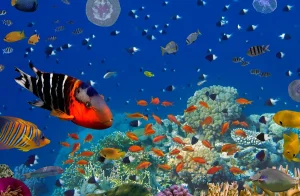How They Are Born and Why They Are Important
Coral reefs are some of the most picturesque and rich ecosystems on the planet. They are like underwater cities, inhabited by thousands of species of marine life. These amazing structures take years, sometimes centuries, to form, and play a key role in maintaining the balance of marine life. But how exactly do coral reefs appear, and why are they so important to the ocean?
Corals are not rocks or plants, but animals, or more precisely, colonies of tiny organisms called polyps. Polyps secrete a calcareous skeleton, which accumulates over time and forms a reef. In order to begin to form, corals need special conditions: warm water, sufficient light, and cleanliness. This is why reefs are most often found in tropical latitudes, where the sea is warm and clear.
The process of coral reef growth takes centuries. New generations of polyps build their skeletons on top of the old ones, creating complex, porous structures in which fish, crustaceans, and other marine animals find shelter. Reefs serve as homes, nurseries for young fish, and protection from currents and predators. Without corals, many species of marine life would simply lose their habitat.
Coral reefs also play an important role in protecting coastlines. They soften the force of waves and storms, preventing shoreline erosion and protecting coastal communities from flooding. Moreover, reefs are of enormous economic importance: millions of people around the world depend on them for fishing, tourism, and scientific research.
However, today, coral reefs are under threat. Rising ocean temperatures, pollution, overfishing, and mass tourism are causing coral bleaching and the death of entire ecosystems. When corals lose the symbiotic algae that live inside their tissues, they become pale and weak, which can lead to their death.
Despite these threats, there is good news: scientists and environmentalists around the world are working to restore reefs, create marine reserves, and educate the public. Everyone can do their part by reducing plastic use, supporting sustainable tourism, and raising awareness of the value of coral reefs.
Coral reefs are more than just beautiful underwater landscapes. They are complex and fragile ecosystems that support the health of the entire ocean. Understanding their importance and working to preserve them is our duty to nature and future generations.
